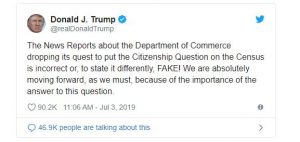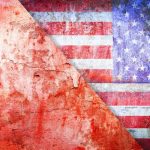Part II
Another Perspective: Can We Not Hear Them?
by An American
Strategic Indirect Warfare: You Do Not Need To Know You Are At War To Be At War
Seeing. Seeing used to mean viewing the facts around us with our eyes, then considering their context, and ultimately perceiving, discerning, and finally understanding. Together with hearing, seeing should make us more capable of handling the troubles of our world. Yet today it seems many of us have gone both blind and deaf to what is happening around us, or worse, we believe we don’t need to look or listen because we already know and understand what is going on; i.e. we’re Too Dumb To Live (TDTL).1
As some of you may recall, in my recent paper entitled “Can We Not Hear Them” I stated that whether we realize it or not, we are currently at war with an undeclared and ill defined alliance of foreign and domestic adversaries who are intent upon:
- Eroding the power of the United States,
- Rewriting and/or redefining our Constitution, and
- Destroying our way of life wherein the individual and not the state is sovereign.
I contend that we have been in this war for the better part of a century without recognizing it, or when we did acknowledge its existence punishing those who made us aware of it, and that this war is currently intensifying.
The Plan for Unrestricted Warfare
For those of you who did not have the opportunity to read the earlier paper, Can We Not Hear Them Part I, I tried to point out that our adversaries have been telling us their plans for decades and yet few of us have taken the time to listen. That first article introduced and examined the concept of Strategic Indirect Warfare (SIW) from a Russian perspective using the long range operational plan provided by one of their own agents.2,3
This article will attempt to complement the previous article by providing a Chinese perspective with regard to SIW and, in truth, is little more than a report on a book published in 1999 by two Colonels in the Chinese Peoples’ Liberation Army (PLA), Col. Qiao Liang and Col. Wang Xiangsui, entitled Unrestricted Warfare.4
Although, this book has been around for more than 20 years, few in the West even know of its existence, let alone have seen or read it. It is not known how much of Qiao and Wang’s book has become official state doctrine, although current affairs would imply it has certainly not been ignored by Chinese leaders. The bottom line is this book provides a road map of how economically and militarily inferior states, organizations, even individuals might best strike at the United States.
While similar and in some ways complimentary to Russia’s operational plan, Qiao and Wang do a better job of expressing their thoughts than the Russians did.
The Colonels came forth in the open while the Russians tried to keep their plans secret. Fortunately for the Chinese and unfortunately for us, Unrestricted Warfare has been translated into several languages and therefore has become operationally useful to a broader spectrum of our adversaries than the Russians plan ever did.
Let me start by asking who among us has seen the nature of the next war? The answer is we all have, and then again we all have not.
- When we apply sanctions against our adversaries, we are practicing a portion of Qiao and Wangs counsel on unrestricted war.
- When outsiders interfere in our elections as the Russians and others may have done in 2016, or
- When George Soros manipulated foreign currencies that affect our and our allies’ economies (or pursues a plan to manipulate our legal system as he currently is doing).
These are concrete examples of actions the Colonels advised could be used against America. Other examples recommended by Qiao and Liang include the actions of international corporations like Google and Facebook to influence the thinking of individuals and/or prohibit their first amendment right to freedom of speech.5 This type of activity is right in line with their writings.
Military Operations Other Than Combat (MOOTC)
Whatever we call these actions, they make up a set of actions known to both the Chinese and the U.S. as Military Operations Other Than Combat (MOOTC). When employed by our adversaries against us, MOOTC are intended to weaken the United States by dividing us and pitting us against one another, destroying our faith in our legal system, undermining our economy, and causing us to question our faith in the competence and ethics of our elected leaders.
Qiao and Wang believe America’s pursuit of high technology is simultaneously its greatest strength and vulnerability. Their examination of American dependence upon technology was groundbreaking, seminal, thorough and provides a very sobering read. Their presentation might at times appear convoluted to some, due to the historic examples they employ and their reliance upon interesting theories such as the Golden Sector6 and the Side-Principle7 in the Chinese language to define a set of rules for victory. Nevertheless, other than the cultural differences that one must take into account, their book is straight forward, comprehensive, and illuminating. When taken as a guide for future Chinese and U.S. relations, it absolutely must be considered worthy of thoughtful contemplation.
How did we get here?
To assist us in our efforts to understand Qiao and Liang, let’s first set the stage. Starting with the Viet Nam War and extending through Operation Desert Storm right up to today’s confrontation with Iran, the nature of conflicts (note I do not limit this discussion to declared wars, has been evolving rapidly. The most notable feature of this new development is reflected in advancements of, and our growing dependence upon, technology in both the military and civilian sectors. Our ever increasing dependence on information technology, artificial intelligence systems, and systems comprised of systems has grown at an astonishing rate. You can believe that dependence includes the costs we willingly expend on its development and maintenance and that this has not gone unnoticed by our adversaries. Have you heard the term “theft of intellectual property?”
All Systems Fail
Unfortunately for us what has been overlooked in our society, as any competent engineer will tell you, is the fact that all systems fail. Simple systems usually fail in simple ways that can be diagnosed and fixed relatively easily. On the other hand, complex systems like satellite navigation are more difficult to diagnose when they fail and their restoration is more troublesome.
Now, we find ourselves dependent upon extraordinarily complex systems consisting of interdependent systems like satellite navigation, drone deployment, the power grid, information technology, the cloud, transaction processing systems, customer relationship systems, business intelligence systems, knowledge management systems, and even bit coins. Failure of one element in such complex entities can be disastrous, yet nearly impossible to diagnose and restore.
Concurrent with the rise of technology has been the emergence of non-state actors on the world stage who are imminently capable of exploiting its vulnerabilities. These include, but are not limited to:
- Religious extremist groups like ISIS and Hamas,
- Political groups like the European Union (EU),
- Large money handlers like the International Monetary Fund (IMF),
- International corporations,
- International criminal cartels and
- Extremely wealthy individuals, for example George Soros, who can and does manipulate the currencies and internal politics of nations.
These are the conditions upon which Qiao and Wang built their analysis of future war.
The Colonels’ View of the World
Qiao and Wang’s believe that the United States will be China’s principal adversary in any future conflict and to some in the U.S. the feeling is mutual.8 We learn from Graham Allison that as far back as the Nixon administration the U.S. has been aware that classical Chinese foreign policy has been guided by three tenets:
- Demand for regional dominance,
- A Need for the other regional powers to recognize China’s superiority, and
- China’s intent to use their dominance and superiority to establish a regional harmony and peaceful coexistence.9
Today, most acknowledge America’s current position as the world’s only super power, but Xi Jinping’s view is that the communist party and only the party under his leadership, can hold China together as it undergoes its transition into becoming a global power. Xi wants China to become the largest economy in the world within the next decade.10
Based on this understanding of Chinese political thought, it is not surprising that two Colonels in the PLA would research and write a book that examined the vulnerabilities of relatively recent changes in the roles of technology and social structure that might be imposed upon the United States.
In this short report one can summarize their efforts in two ways:
- Future conflicts will not be confined to conventional battlefields, and
- New methods of “fighting,” will be just as effective if not more so than conventional confrontations on traditional battlefields
Let’s examine each of these from their point of view:
Future Conflicts Will Not Be Confined to Conventional Battlefields
Qiao and Wang ask the interesting question:
In this age, when the plethora of new technologies can in turn give rise to a plethora of new means and methods of fighting war, (not to mention the cross-combining and creative use of these means and methods), it would simply be senseless and a waste of effort to list all of the means and methods one by one. What is significant is that all of these war fighting means, along with their corresponding applications, that have entered, are entering, or will enter, the ranks of war fighting means in the service of war, have already begun to quietly change the view of warfare held by all of mankind. Faced with a nearly infinitely diverse array of options to choose from, why do people want to enmesh themselves in a web of their own making and select and use means of warfare that are limited to the realm of the force of arms and military power?11
This is the question that makes their book so provocative; however, their answer is even more provocative:
The enlargement of the concept of warfare has, in turn, resulted in enlargement of the realm of war-related activities. If we confine ourselves to warfare in the narrow sense on the traditional battlefield now, it will be very difficult for us to regain our foothold in the future. Any war that breaks out tomorrow or further down the road will be characterized by warfare in the broad sense — a cocktail mixture of warfare prosecuted through the force of arms and warfare that is prosecuted by means other than the force of arms.12
You might be asking what are the ingredients of that cocktail?
New Methods of Fighting
Qiao and Wang reasoned that because of the economic and military superiority of the United States, poorer or weaker countries and non-state actors will all have to employ unconventional weapons to weaken the U.S. prior to facing us on conventional battlefields.
They offered the following examples of these methods:
- Psychological Warfare: “We can point out a number of other means and methods used to fight a non-military war, some of which already exist and some of which may exist in the future. Such means and methods include psychological warfare (spreading rumors to intimidate the enemy and break down his will)”.
- Smuggling Warfare: Throwing markets into confusion and attacking economic order.
- Media Warfare: Manipulating what people see and hear in order to lead public opinion along;
- Drug Warfare: Obtaining sudden and huge illicit profits by spreading disaster in other countries;
- Network Warfare: Venturing out in secret and concealing one’s identity in a type of warfare that is virtually impossible to guard against;
- Technological Warfare: Creating monopolies by setting standards independently;
- Fabrication Warfare: Presenting a counterfeit appearance of real strength before the eyes of the enemy;
- Resources Warfare: Grabbing riches by plundering stores of resources;
- Economic aid Warfare: Bestowing favor in the open and contriving to control matters in secret;
- Cultural Warfare: Leading cultural trends along in order to assimilate those with different views, and
- International Law Warfare: Seizing the earliest opportunity to set up regulations), etc., etc”13
The Media Warfare Influence
Importantly, Qiao and Liang specifically called out the need to control the media in future wars. For example in a section entitled “Another Player Hidden Behind the Victory”, it states, “ …with real-time or near real-time reports turning warfare into a new program that ordinary people can monitor directly via the media, and thus the media has become an immediate and integral part of warfare, and no longer merely provides information coming from the battlefield . . . in all future wars, in addition to the basic method of military strikes, the force of the media will increasingly be another player in the war and will play a role comparable to that of military strikes in promoting the course of the war.”
The effects of the media have always been a two-edged sword. This means that, while it is directed at the enemy, at the same time on another front it can similarly be a sharp sword directed at oneself.
The impact of the media on warfare is becoming increasingly widespread and increasingly direct, to the point where even major decisions by the president of a superpower such as this one involving the cessation of hostilities are to a very great extent rooted in the reaction to a single television program. From this, one can perceive a bit of the significance that the media carries in social life today. One can say entirely without exaggeration that an uncrowned king has now become the major force to win any battle.”14 In our current environment of fake news, does any of this bother you or make you wonder who is driving it?15
That Soros Checkbook
Regarding individuals, for example, you might ask yourself why would George Soros be financing the political campaigns of local District Attorneys all over the United States? That happens to be exactly what he is doing at this time. We, meaning each and every one of us, should be concerned about this. Shouldn’t we know who is financing each candidates campaign in our elections?
Illegal Immigrant Caravans
Another question might be: whose money is really financing the movement of illegal immigrants (incidentally this is another non-military war operation specifically identified by Qiao and Liang) through Central America and why are they doing it?16 Could the weakening of the U.S. economy and/or the separation of our population into adversarial groups be their real objective?17
There are several estimates of the cost that average around $134 billion depending on how many illegals are actually in the U.S. and what is actually included in the cost number; e.g., the cost of operating and defending the border, welfare, education, health care, legal fees incarceration, etc.18
America’s Drug Problem
Another unanswered question is who is providing the fentanyl that is at the core of the drug problems in America? Many think that it is China.19 Fentanyl is being shipped openly from China to Mexico where it is then smuggled over our southern border. Ask yourself, if you were profiting from the illegal drug trade, wouldn’t you want an open southern border? Now ask yourself, who is pushing for an open border and obstructing the strengthening of our southern border?
Censuring the U.S. Census
Perhaps another question we should be asking ourselves is why do some people want to prevent the census from asking folks if they are citizens. If we actually knew how many illegal immigrants were in the country wouldn’t we be better able to identify the actual costs of their presence?

China’s U.S. Computer Network Access
One of the Colonels’ most sinister examples makes us ask why would the Chinese flood the security camera market in the U.S. with cameras that require a link back to China through the cloud to function, or why has Huawei20 been designated a security threat?
Beyond the information these links could and probably do provide, doesn’t this also give them a masked access to our computer networks? Makes one wonder, doesn’t it?
Summary
Qiao and Wang, as military officers, focus their attention on our military, but then removed this limitation and opened the field of war to all sectors of our society. Strategies and tactics then became limitless. What these Chinese Colonels have done is to challenge the United States to respond to a completely new form of warfare that finds its genesis in the complexity of the 21st Century’s technological society.
They make this quite clear when they say: “The difference between the concepts of “non-military war operations” and “military operations other than war” is far greater than a surface reading would indicate, and is by no means simply a matter of changing the order of some words in a kind of word game.
The latter concept, MOOTW, may be considered simply an explicit label for missions and operations by armed forces that are carried out when there is no state of war. The former concept, “non-military war operations,” extends our understanding of exactly what constitutes a state of war to each and every field of human endeavor, far beyond what can be embraced by the term “military operations.”21
This author readily admits that he is unable to do justice to the brilliance of these two Chinese Colonels. Rather, what this author has tried to do in this article is introduce the American public to Qiao and Liang and their concept of Unrestricted War in the hope that at least some of us will listen to what they have said and see more clearly what is going on around us as it relates to their writings.
If we choose to ignore them and others like Yuri Bezmenov, we are indeed TDTL and deserving of the heinous things that will assuredly come to us.
Final thought from the author:
Each of us has a responsibility to act knowledgeably at the poles in 2020. Please, take a little time and do your research before you vote. It’s important.
Footnotes
1 Pronounced “tiddle.”
2 A Strategic Indirect War (SIW) is a war that includes armed force and unarmed force, military and non-military actions conducted on and off conventional battlefields, and employs overt and covert tactics waged by a coalition of technologically astute adversaries working either independently or in coordination as opportunities to attack the U.S. present themselves.
3 Bezmenov, Yuri:https://www.azquotes.com/author/34033-Yuri_Bezmenov
4 Qiao Liang and Wang Xiangsui, Unrestricted Warfare, PLA Literature and Arts Publishing House, Beijing, China, February, 1999.
5 https://conservativefiringline.com/freedom-watch-files-1-billion-lawsuit-against-facebook-
twitter-google-apple-for-censorship-of-conservatives/
6 A ratio, observed especially in the fine arts, between the two dimensions of a plane figure or the two divisions of a line such that the smaller is to the larger as the larger is to the sum of the two, a ratio of roughly three to five. Also called golden ratio. from:https://www.thefreedictionary.com/golden+section
7 There is a basic sentence structure In the Chinese language that divides a sentence or phrase into two parts, the objective and its modifiers. As implied by their designations, one is always being modified while the other does the modifying. For example; strong economy, happy citizen, smart bombs, hypersonic missile, global positioning satellite.
8 The People’s Republic China needs to be seen by the United States as its principal potential adversary in the years ahead. From: https://news.usni.org/2017/09/15/expert-u-s-see-china- number-one-adversary-not-trading-partner
9 Allison, Graham, Destined for War, Mariner Books, Boston – New York, 2017. p110.
10 From: https://www.belfercenter.org/publication/emperor-xis-china-done-biding-its-time
11 Qiao Liang and Wang Xiangsui, ibid. Page 56
12 Qiao Liang and Wang Xiangsui, ibid. Page 56
13 Qiao Liang and Wang Xiangsui, ibid. Pages 67-68
14 Qiao Liang and Wang Xiangsui, ibid. Pages 67-68
15 See https://foreignpolicy.com/2017/12/21/one-of-americas-biggest-chinese-language- newspapers-toes-beijings-party-line-china-influence-united-front/
16 https://www.americanthinker.com/articles/2018/10/ illegal_caravans_encouraged_by_honduras_and_soros.html
17 For an objective overview of this subject see: https://cis.org/Testimony/Illegal-Immigration- Impact-Wages-and-Employment-Black-Workers
18 https://www.gatestoneinstitute.org/11829/illegal-immigration-cost
19 https://www.spartareport.com/2017/10/fentanyl-from-china-is-killing-thousands-in-the-us/
20 https://www.theverge.com/2019/3/17/18264283/huawei-security-threat-experts-china- spying-5g
21 Qiao Liang and Wang Xiangsui, ibid. Page 49













